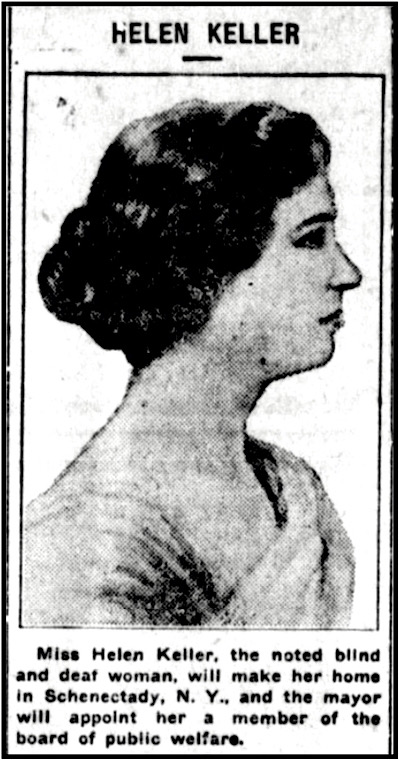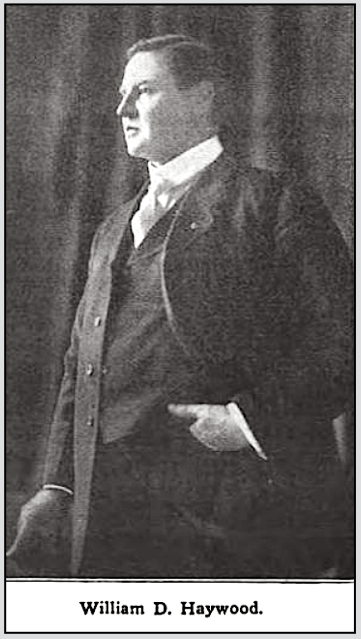 —————
—————
Hellraisers Journal – Tuesday November 5, 1912
Miss Helen Keller States She Would Love to Carry the Red Flag Past The Times
From The New York Call of November 3, 1912:
How I Became a Socialist
-by Helen Keller
———-
For several months my name and socialism have appeared often together in the newspapers. A friend tells me that I have shared the front pages with baseball, Mr. Roosevelt and the New York police scandal. The association does not make me altogether happy but, on the whole, I am glad that many people are interested in me and in the educational achievements of my teacher, Mrs. Macy (Anne Sullivan). Even notoriety may be turned to beneficent uses, and I rejoice if the disposition of the newspapers to record my activities results in bringing more often into their columns the word Socialism. In the future I hope to write about socialism, and to justify in some measure the great amount of publicity which has been accorded to me and my opinions. So far I have written little and said little about the subject. I have written a few letters, notably one to Comrade Fred Warren which was printed in the Appeal to Reason. I have talked to some reporters, one of whom, Mr. Ireland of the New York World, made a very flattering report and gave fully and fairly what I said. I have never been in Schenectady. I have never met Mayor Lunn. I have never had a letter from him, but he has sent kind messages to me through Mr. Macy. Owing to Mrs. Macy’s illness, whatever plans I had to join the workers in Schenectady have been abandoned.
On such negative and relatively insignificant matters have been written many editorials in the capitalist press and in the Socialist press. The clippings fill a drawer. I have not read a quarter of them, and I doubt if I shall ever read them all. If on such a small quantity of fact so much comment has followed, what will the newspapers do if I ever set to work in earnest to write and talk in behalf of socialism? For the present I should like to make a statement of my position and correct some false reports and answer some criticisms which seem to me unjust.
First — How did I become a Socialist? By reading. The first book I read was Wells’ New World for Old. I read it on Mrs. Macy’s recommendation. She was attracted by its imaginative quality, and hoped that its electric style might stimulate and interest me. When she gave me the book, she was not a Socialist and she is not a Socialist now. Perhaps she will be one before Mr. Macy and I are done arguing with her.
My reading has been limited and slow. I take German bimonthly Socialist periodicals printed in braille for the blind. (Our German comrades are ahead of us in many respects.) I have also in German braille Kautsky’s discussion of the Erfurt Program. The other socialist literature that I have read has been spelled into my hand by a friend who comes three times a week to read to me whatever I choose to have read. The periodical which I have most often requested her lively fingers to communicate to my eager ones is the National Socialist. She gives the titles of the articles and I tell her when to read on and when to omit. I have also had her read to me from the International Socialist Review articles the titles of which sounded promising. Manual spelling takes time. It is no easy and rapid thing to absorb through one’s fingers a book of 50,000 words on economics. But it is a pleasure, and one which I shall enjoy repeatedly until I have made myself acquainted with all the classic socialist authors.
In the light of the foregoing I wish to comment on a piece about me which was printed in the Common Cause and reprinted in the Live Issue, two anti-socialist publications. Here is a quotation from that piece:
“For twenty-five years Miss Keller’s teacher and constant companion has been Mrs. John Macy, formerly of Wrentham, Mass. Both Mr. and Mrs. Macy are enthusiastic Marxist propagandists, and it is scarcely surprising that Miss Keller, depending upon this lifelong friend for her most intimate knowledge of life, should have imbibed such opinions.”
Mr. Macy may be an enthusiastic Marxist propagandist, though I am sorry to say he has not shown much enthusiasm in propagating his Marxism through my fingers. Mrs. Macy is not a Marxist, nor a socialist. Therefore what the Common Cause says about her is not true. The editor must have invented that, made it out of whole cloth, and if that is the way his mind works, it is no wonder that he is opposed to socialism. He has not sufficient sense of fact to be a socialist or anything else intellectually worthwhile.
Consider another quotation from the same article.
The headline reads: “SCHENECTADY REDS ARE ADVERTISING; USING HELEN KELLER, THE BLIND GIRL, TO RECEIVE PUBLICITY.”
Then the article begins:
“It would be difficult to imagine anything more pathetic than the present exploitation of poor Helen Keller by the Socialists of Schenectady. For weeks the party’s press agencies have heralded the fact that she is a Socialist, and is about to become a member of Schenectady’s new Board of Public Welfare.”
There’s a chance for satirical comment on the phrase, “the exploitation of poor Helen Keller.” But I will refrain, simply saying that I do not like the hypocritical sympathy of such a paper as the Common Cause, but I am glad if it knows what the word “exploitation” means.


 —————-
—————-
 —————
—————
 Comrades and Fellow-Workers:
Comrades and Fellow-Workers: